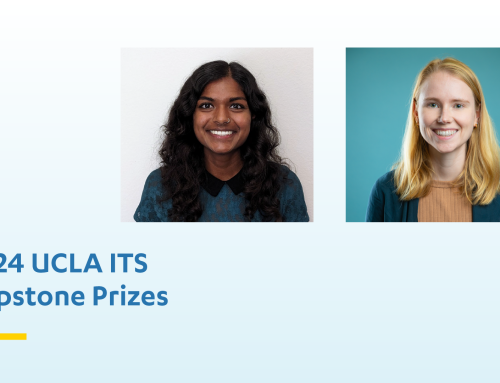To fulfill their degree requirements, urban planning graduate students at the UCLA Luskin School of Public Affairs must either write a thesis paper or complete a project on behalf of real-world clients. Each year, UCLA ITS provides funding for a set of student research projects that provide valuable insights into today’s pressing transportation questions. Additionally, at the completion of their capstone projects, ITS awards students who conduct exceptional research and produce meaningful findings for the transportation field.
This year, nine projects — 14 students total — were recognized for their excellent contributions. We are confident that their research will provide the critical evaluation that their clients need, and will shape how practitioners approach these issues in the future.
Grand prize awards went to Shelly Quan, MURP ‘21, who received the ITS Capstone Prize for her project, California Government Screening Maps: An Investigation into Geographic Prioritization in Support of State Climate and Planning Goals, and Jayne Vidheecharoen, MURP ‘21, who received the inaugural Excellence in a Transportation Equity & Justice Capstone Prize for her project titled Equity Lenses: Targeting Equitable Community Investment Across Southern California. Both awards included a prize of $5,000.
ITS Capstone Prize: California Government Screening Maps | Shelly Quan
For her capstone project, Quan conducted a thorough analysis of four maps used by California agencies to guide investments — Healthy Places Index, Opportunity Area Maps, Priority Populations Map, and the CalEnviroScreen — and gauged how often these planning tools complement or conflict with one another. Quan researched how adherence to the maps help decision-makers meet the state’s climate and planning goals, and what opportunities might exist to coordinate in support of the state’s goals.
Quan’s key finding was that housing has not been produced in areas that received priority designation in the maps — meaning the areas where it would most help achieve the state’s climate and planning goals — despite there being significant overlap among the maps’ priority areas. Even considering the state’s ambitious climate goals, Quan also found that none of the maps include transit access or proximity as indicators.
As the state becomes increasingly reliant on these maps for determining and implementing policy priorities, it becomes all the more necessary to evaluate their impacts and ensure that they work together.
“I hope the findings of this research will be used to generate discussion that can inform the work needed to coordinate multi-agency efforts across housing and transportation to meet the state’s long-term climate and planning goals,” said Quan.
Quan’s research fills the glaring gap in analysis of how state policy maps interrelate, and highlights the disconnect between their stated priorities and their actual impacts, as demonstrated through housing.
Transportation Equity & Justice Capstone Prize: Equity Lenses | Jayne Vidheecharoen
For her project, Vidheecharoen conducted a comprehensive review of SCAG’s planning and funding programs through an equity lens to take on the thorny question: how can SCAG allocate its various streams of funding to best address inequities? Her research included examples from other Metropolitan Planning Organizations (MPOs) across the country and case studies comparing SCAG to three other MPOs that drew upon MPO documentation and interviews with key staff.
Vidheecharoen found that numerous MPOs already incorporate equity-driven strategies to target investment, including using broader definitions to determine focus communities, using mapping tools to visualize them, and integrating multiple approaches to equity. She applied these findings to produce detailed recommendations and prototypes for two digital products for SCAG: an ArcGIS app prototype, a data-based spatial tool to visualize the most impacted areas and identify gaps in past funding investments, and a scorecard system with unified equity indicators to guide awarding in the Southern California region. She emphasized that moving forward, SCAG’s key focus should not be to gather more data on equity indicators, as significant data already exists, but rather to understand how existing indicators and indexes can work together to provide the information that SCAG needs.
“My hope is that SCAG can use the recommendations to prioritize resources more holistically, look at equity from multiple angles, and be mindful of the ways different factors intersect to impact the communities,” Vidheecharoen said. “I also hope it encourages them to be more transparent about their process and outcomes.”
Vidheecharoen’s exhaustive research, combined with practical deliverables and detailed recommendations for applying them, provides SCAG with much-needed products that they can rapidly implement. As Southern California’s MPO, SCAG has the opportunity to make significant investments towards equity – but these investments must be made carefully to achieve the greatest impact. Vidheecharoen provides SCAG with the tools to “operationalize equity,” to support communities across the Southern California region and influence MPOs across the country.







